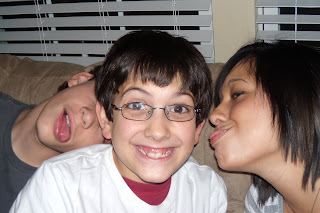I’m writing this blog about an event that occurred two days ago, which, due to our jam-pack and stimulating schedule, feels like more like a month. We visited the Thai Embassy on Wednesday, 1/14/09, and that is what this blog is about.
Wednesday afternoon…temperatures drop. We head out on a 30-minute walk to an obscure destination, the Royal Thai embassy. Somewhere in the middle of the Georgetown University area we arrive upon a tidy, secure, three-story building that is our destination. Once there, we tumbled inside the twice-secured door, breathless and blustered by our cold and tardy situation. We rushed upstairs and peeled off layers of coats, and enjoyed the consumption of a few Thai treats offered to us by our gracious hosts. We then sat down to a 45-minute breakdown of the roles and functions of the Thai government and Thai Embassy. Our presenters then took questions from the audience, which consisted of about 50 participants of the Washington Center Seminar. The questions were the regular, relevant, smart-sounding inquiries that attentive college students are expected to ask in such a setting, and pertained to things like foreign policy, import/export products, economy, et cetera. But I was waiting to ask a question that had been percolating in my mind since the first time I visited Thailand exactly three years ago….
Rewind. Excuse me as I switch to third person in order to properly perceive this story once again.
January, 2006. 18-year-old Morgan had been working in a children’s home in Bangalore, India for the past five months, and went on a 10-day vacation to Bangkok, Thailand. Once there, she was perpetually impressed by the mega-malls, clean streets, courteous people, and awesome street food! She loved lots of aspects of her experience there, but one reoccurring sight confused and perplexed her. Everywhere, everywhere, everywhere she went, she saw middle-age or old men accompanied by one or two young beautiful Thai girls. Morgan was disturbed by this frequent sight, and asked her friends, who had lived in Thailand for many years, what this phenomenon was. They sadly and gently explained that Thailand has become a leading market in one of the world’s most profitable businesses – human flesh. They explained that most of these girls were prostitutes – not by choice, but by painful and complicated varied circumstances. Morgan was devastated, enraged, and confused at how such blatant and disgusting disregard for the sanctity of a woman’s body and human dignity could be so openly tolerated and accepted. Her friends continued to explain that the level of this corruption infiltrated every tier of Thai life, and greatly contributed to the tourist population. In fact, Thailand is known to many as a prime purchasing destination for this one thing: sex.
Fast-forward.
Two and a half years later, July of 2008…21-year-old Morgan is in India all summer, working alongside her best friend with drug-addicted street kids in Calcutta. They go again to Thailand, to Bangkok and Pattiya, but this time Morgan is armed with a little more information. She has been reading, researching, learning about this thing called Human Trafficking, or the illegal sale and exploitation of human beings. She is gripped by this world-wide epidemic of slavery, and this time, she knows what it is that she’s seeing. She knows what the neon lights and disturbing sights and violated rights is, and she’s still grieved, distressed, and enraged. Some vacation. She can no longer plead ignorance and thereby turn a blind eye to the hopeless plight of millions of people, nor does she want to. But she does not know what to do. She cannot break down brothel doors, rescue ravaged children, redeem the raped bodies and souls. So she prays, and waits, and learns, and informs, and hopes and believes that in order for us to see world-wide restitution of this issue, world leaders have to acknowledge the issue and take unified and convicted action against it. This experience in Thailand is largely why Morgan was so eager and excited to participate in this current experience in Washington.
Fast-forward again, and stop. Right here. Right now. 1/16/09. The Washington Center Presidential Inauguration Seminar students visit Royal Thai Embassy in Washington D.C. Morgan’s group gets to go. And Morgan is elated at the prospect of really hearing, from the “horse’s mouth,” what the government is doing to address this issue. So she raises her had, at first nonchalantly, and then with increasing urgency, prodded by her friend to ask this question that could be controversial, yet is hugely pertinent.
“We’re almost out of time,” they say, “So one more question.” I stretch my hand higher, and when called on, commence: “Thank you. I’ve had the opportunity to visit your beautiful country on several occasions, and have greatly enjoyed my experience. You have a wonderful country to be very proud of. Yet I was disturbed to see the global issue of human trafficking so prevalent there. Could you tell me what the government is doing to counteract this growing issue, and also, does the high participation of wealthy and often high-ranking American, European, and Middle Eastern individuals greatly hinder this issue from being resolved or more aggressively addressed?”There. I asked it. This is what I’ve been wanting to know – if the people who hold the power are doing what it takes to make the change, or if they, like many American politicians, are drunk by their elevated position and removed from the desperate situations of the people which comprise their country. Essentially what I’m asking, and what I’ve been asking, is just this; if I want to counteract social injustice, and see change and hope and freedom brought to the lives of those that the world has deemed dispensable and worthless, should I focus my energies of approach on the bottom-up (by working with grassroots and volunteer organizations), or from the top-up (by advocating change from a position in government itself.)?
The answer I receive was sadly short of satisfying. In the Thai embassy, they expressed awareness to the issue, and to the multi-level approach that any sort of solution must take. The talked vaguely about organizations that help families and girls who are forced into their situations. They responded as they should; professionally, sympathetically, politically. But their regulated response lacked compassion, lacked vision, lacked deep desire and motivation to see this problem rapidly and drastically resolved, not for the sake of the reputation of their nation, but for the sake of the lives destroyed. And this short interaction – my thirty-second question and their one-minute answer - portrayed to me a greater picture of what tragically but frequently takes place in governmental institutions. The leaders lose touch with the people they are designing to serve – is it not curious that our lawmakers and the determiners of literally every aspect of our nation live far removed from and have no grid for the daily life of the millions of people they represent? How, then, can we expect our government or any to operate out of any deeper motivation than their own good and social/moral obligation? Why is a government which is described to be for the people, by the people really just a government – no people truly involved?
I cannot honestly say that I’ve come to any firm conclusion, nor had any brilliant epiphany in regards to my question. I can only say that I and others deeply care, but don’t know where to go to see legitimate, legal changes without losing heart, hope, and the touch of humanity in the long grueling legislative process. It’s not right that the ravaged bodies and souls of millions of innocent victims is not enough to stop every man, woman, and child in their tracks until the exploitation and destruction ends. It’s not right that the physical, spiritual, and emotional wounds are translated into little more than country boundaries and dollar signs in the eyes of policymakers. Conviction, passion, determination are all critical elements of seeing these things come to an end, but there is a missing ingredient, a key component, a “greater than” and “better than” and “other than” solution than what I’m seeing take place right now. Until the time when these bitter tragedies are no more, however, these are the tools we’ve been given, and so I appeal to you to arm yourself with these things also, and change whatever corner of the universe you dwell in.
“Be the change you want to see in the world.” ~ Ghandi



















